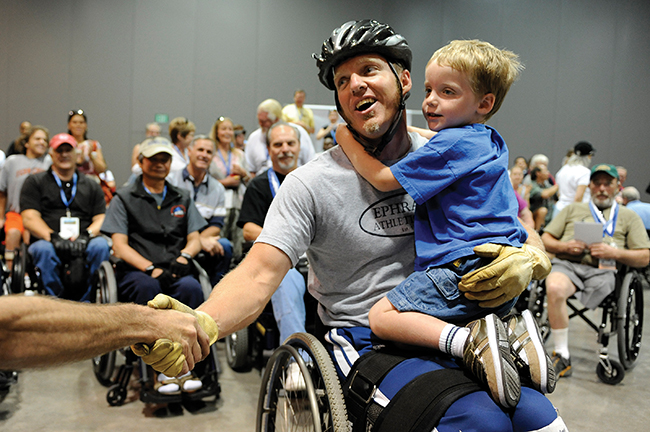
Sean Halsted shakes hands with a fan as he holds his son, Ethan, after completing the slalom super g competition Jul. 16 during the 29th National Veterans Wheelchair Games in Spokane, Wash. (U.S. Air Force photo/Staff Sgt. Desiree N. Palacios)
There’s a home video on YouTube that shows just how much one individual can accomplish, despite being paralyzed by free-falling from a helicopter. The video features U.S. Air Force Veteran and Paralympian Sean Halsted.
Sean’s wife, Sarah, made the video to document her husband’s rise from the wetland floor of Hurlburt Field, an Air Force installation in Florida, to the snowy peaks of Whistler Mountain in British Columbia.
Four years ago in Whistler, Sean competed in three events at the Vancouver 2010 Paralympic Winter Games. He didn’t win a medal, but he kept training for a second chance. Sean is set to compete in the 2014 Paralympic Winter Games in Sochi (so-chee), Russia, starting March 7, 2014.
Sean’s sport is cross-country (Nordic) skiing. In this sport, participants pull (with poles), skate (when they are able), and cruise on long, slender skis along courses ranging from one to 20 kilometers in length. Sean is paralyzed from the waist down, so he competes in a kneeling position on a specialized sit ski, which takes any measure of skating out of the mix.
“It’s fun being out there in the woods and on the slopes, pushing yourself to the limit, all while being in a serene environment,” said Sean, who tried sled hockey and wheelchair basketball before going all-in on cross-country skiing.
Pushing himself is not new for the Pacific Northwesterner. He ran cross country through high school and rowed crew at Washington State University. The accident, which shattered his L1 vertebrae, happened during a search-and-rescue training exercise in 1998.
“My entire life was active, on the move, and suddenly it was gone,” he said.
Through early rehab, Sean said he began thinking his life would be spent on the couch surfing the Internet and playing Nintendo—which would have been completely foreign to him just a few months before.
“As a combat controller, you have these expectations,” he said. “You can’t accept sitting in your room.”
He struggled for two years before reluctantly attending the National Disabled Veterans Winter Sports Clinic and finding inspiration. And it’s that 2001 experience at the National Disabled Veterans Winter Sports Clinic that he credits with igniting his Paralympic dream. “My jaw dropped,” he said of his first experience at the clinic.
“I sat there, watching people push themselves like I used to and wondered, ‘How much time did I waste?’” he said.
Established in 1986, the Winter Sports Clinic shows disabled active-duty Soldiers and Veterans that an active life is still attainable. “I saw them [fellow Veterans] with kids, with families,” he said. “I saw them living. All these things I thought that were taken from me, these people were enjoying.”
Since the clinic, Sean has pulled his way to a spot as one of four members of the U.S. Paralympic Nordic Ski Team. The sport has led him around the world, including to the 2010 Paralympic Winter Games in Vancouver, where he finished among the top ten in the 1-km sprint, and the 10-km and 15-km competitions.
Sean and his wife also started a family: twins Ethan and Rileigh, 8, and Keelie, 3. Days once spent sulking are now spent balancing being an athlete and a father.
Despite all the adversity, Sean seems to have found his way again, and he believes the intensity and self-mastery that his sport demands may also help his fellow Veterans.
While he is determined to reach the medal podium at the 2014 Paralympic Winter Games in Sochi, Sean also thinks about other Servicemembers who become disabled and face the same obstacles he once did.
“Gold isn’t the be-all, end-all goal,” he said. “I mean, yeah, I want to win. But if I get someone off the couch and wanting to do something, that’ll mean just as much to me. If I can be that example that people can touch, people can see, [and] people can grasp, that’ll make the whole Paralympic movement grow.”
In other words, Sean hopes to inspire fellow disabled Veterans in the way that the Winter Sports Clinic inspired him.
“I’ve heard disabled people say, ‘I’m not going to do sports because I don’t need a charity medal,’” Halsted said. “You try it, and tell me if it’s still charity.”
Topics in this story
More Stories
Summer Sports Clinic is a rehabilitative and educational sporting event for eligible Veterans with a range of disabilities.
Report examines the input of over 7,000 women Veterans: They are happier with VA health care than ever before.
Veterans and caregivers, you can help shape the future eligibility requirements for the VA Caregiver Support program.








Great post! It shows disability is not an obstacle for success.